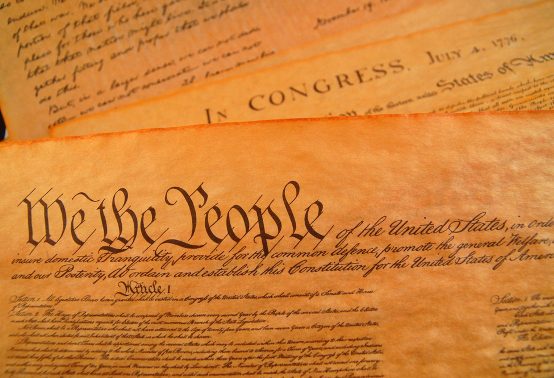Our Constitution Must Be the Battleground

The United States Constitution—praised as “the most wonderful work ever struck off at a given time by the brain and purpose of man” by Lord Gladstone—should be the battleground of American politics. If that does not happen, our Republic is doomed to self-ruination like all other Empires. They all collapsed, among other things, by exalting raw power over constitutionally safeguarded liberty, and the armored knight over the moral philosopher.
The Constitution’s summum bonum is individual liberty—the opportunity to develop faculties and pursue ambitions free from domestic predation or foreign aggression. The Declaration of Independence elaborates that every individual is endowed with a natural right to life, liberty, and the pursuit of happiness, i.e., wisdom and virtue. In contrast, governments, communities, or groups have no natural rights. Indeed, the government’s purpose is to secure the natural rights of individuals.
Under the Constitution, individual liberty is celebrated for its own sake, while government or community decrees or norms are presumptively suspect. Individual liberty is the locomotive and the community the caboose in our constitutional universe. Accordingly, government should stay its hand unless an exacting threshold of actual or imminent material injury to individuals would otherwise ensue, for example, murder, robbery, torture, or kidnapping.
No government is endowed with sufficient saintliness or wisdom to direct individuals how to find meaning or fulfillment between ashes to ashes and dust to dust. Political gridlock is ordinarily undisturbing—it safeguards individual liberty.
James Madison sermonized in Federalist 55: “Had every Athenian citizen been a Socrates, every Athenian assembly would still have been a mob.” Groups or communities are characteristically self-serving, and tribal. They are fueled by hormonal instincts and ulterior motives, not by the cerebral faculties or nobility. Alexis de Tocqueville observed in Democracy in America: “[O]ne…finds in the human heart a depraved taste for equality, which impels the weak to want to bring the strong down to their level, and which reduces men to preferring equality in servitude to inequality in freedom.”
The Constitution employs separation of powers and checks and balances to achieve an Aristotelian mean between rule by Platonic guardians and mobocracy. They include separating the legislative, executive, and judicial functions, a bicameral legislature, different rules and representation formulas for the House of Representatives and Senate, an Electoral College that favors sparsely populated states in choosing the president, supermajorities for treaty ratification, constitutional amendments, and overriding presidential vetoes, and an independent Supreme Court empowered to void government excesses.
In praising the Bill of Rights, Mr. Madison observed: “[I]ndependent tribunals of justice will consider themselves in a peculiar manner the guardians of those rights; they will be an impenetrable bulwark against every assumption of power in the legislative or executive; they will be naturally led to resist every encroachment upon rights expressly stipulated for in the constitution by the declaration of rights.” Collectively, the Constitution’s handcuffs on majority rule operate as a structural bill of rights to complement the substantive Bill of Rights in protecting the American people from tyranny.
No law, regulation, policy or government practice should be embraced without a showing that (1) it is authorized by the Constitution; (2) the branch of government responsible for exercising the authority has done so; and, (3) the government has shouldered its burden of documenting with concrete evidence that compromising the individual right to be left alone is justified by a clear, present, and alarming danger to domestic tranquility or national security. Speculation is not good enough to satisfy the third prong. Neither are remote or ephemeral harms.
Probably 90 percent or more of our multi-trillion-dollar warfare state, surveillance state, bail-out state, and welfare state would be eliminated over time if the Constitution were made the battleground of American politics. Among other things, federal taxes and spending would tumble; the national debt would shrink; crony capitalism would die; the economy would flourish; privacy would be honored; and, our nine known unconstitutional, gratuitous presidential wars would cease.
Invincible self-defense would become our national security strategy. The nation’s individual liberty index—the proxy of national greatness—would climb by orders of magnitude.
After at least seven generations of wholesale disregard of the Constitution, the journey to restore regular constitutional order to our politics will be long and fiercely contested—especially by the cosseted multi-trillion-dollar military-industrial-counterterrorism complex. But that is no reason to delay.
On that score, President John Kennedy was wont to relate an anecdote about French Marshall Hubert Lyautey in Morocco. His gardener balked at planting a tree because it wouldn’t mature for a century. The Marshall retorted, “In that case, there is no time to lose. Plant it this afternoon.”
Bruce Fein was associate deputy attorney general and general counsel of the Federal Communications Commission under President Reagan and counsel to the Joint Congressional Committee on Covert Arms Sales to Iran. He is a partner in the law firm of Fein & DelValle PLLC.
Comments